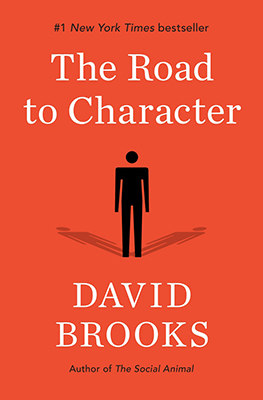ABOUT BOOKS
By Joan Bauer
THE ROAD TO CHARACTER by David Brooks (Paperback) Random House
I must admit that during the reading of David Brooks’ blockbuster New York Times bestseller, I took down my very old Girl Scout Handbook and opened it to the Girl Scout Laws: “A Girl Scout’s honor is to be trusted. A Girl Scout is loyal. A Girl Scout’s duty is to be useful and to help others…a friend to all…courteous… cheerful…a friend to animals…” I remember pledging to be that kind of girl; I remember messing up a lot, but there was something powerful about having ideals to work toward.
David Brooks, New York Times op-ed columnist, who appears regularly on PBS NewsHour, NPR’s All Things Considered, and NBC’s Meet the Press, is a pragmatist with high ideals. He has written a remarkable, humane book for our complicated times. You may agree with his thoughts on morality, mission, and even sin, or you may not. But the journey is fascinating. “I wrote this book not sure I could follow the road to character,” Brooks says, “but I wanted at least to know what the road looks like and how other people have trodden it.”
He weaves stories of people who have built strong inner characters, such as Frances Perkins, Dwight Eisenhower, George Marshall, Dorothy Day, George Eliot, and A. Phillip Randolph— many called literally from the fire. For Francis Perkins, it was witnessing the atrocity of the Triangle Shirtwaist Factory fire. For African American pastor A. Phillip Randolph, it was his dedication to decency and dignity that helped him shape the early years of the civil rights movement. Learning curves are steep, but the roads led to humility and eventually grace, which is never earned. Along with that, what seems to come into each life is a rare joy.

If you are a collector of relevant quotes, like me, you will find them bouncing off the pages:
“Thankfulness is a soil in which pride does not easily grow.” Michael Ramsey, the Archbishop of Canterbury.
“At what point do my talents and deep gladness meet the world’s need?” Frederick Buchner, novelist.
“It did not really matter what we expected from life, but what life expected from us.” Victor Frankl, an Austrian psychiatrist, and Holocaust survivor.
Brooks writes that finding character is a lifetime task, one that is bent on deliberately looking away from yourself to get perspective on yourself. In short, we need to know “the bugs” in our system. That might not ever make it onto a T-shirt, but maybe it should. Narcissism is having a good season, but Brooks makes his case for humility. “Truly humble people are engaged in a great effort to magnify what is best in themselves and to defeat what is worst.”
The crux of the argument is that we must learn to build our characters much more than our resumes. Brooks writes that he fears we’ve become “morally inarticulate. We’re not more selfish or venal than people in other times, but we’ve lost the understanding of how character is built.” Brick by brick, my citizens. Brick by brick. Brooks does not offer a multi-point plan to grow character; he lets the stories speak for themselves. There is a “Humility Code” at the end, but we are reminded that we come to this life as flawed creations with great abilities to grow and change.
I love Brooks as sociologist, and there are enough social factoids to make us think and shudder. Reflecting on humility in government, he offers this: Only one of the 23 members of Eisenhower’s cabinet published a memoir, compared to 12 out of 30 in the Reagan years. As for our children’s sensibilities, Brooks cites a recent survey of middle-school girls who were asked the most wanted person to have dinner with? Jennifer Lopez won that, followed by Jesus Christ and Paris Hilton.
The Girl Scout Handbook does not acknowledge weakness in the pledge, but it embraces honor as a strong force for good and the wonderful word “try”: “On my honor, I will try to… help other people at all times…”
There’s a tendency when undergoing personal improvement to take yourself a little too seriously. Many a Girl Scout has marched out into the cold world to be a light whether people wanted help or not—I was one of those.
The Road to Character does take itself seriously, and I’m glad. It can be a map to carry with you and a message to write across the heart. It is worthy of deliberation and debate.

Joan Bauer is a New York Times bestselling novelist and winner of the Newbery Honor Award, the LA Times Book Prize, and two Christopher Awards. Her latest novel is Soar, published by Viking/Penguin Random House. Connect with her on Twitter @joan_bauer or at joanbauer.com





